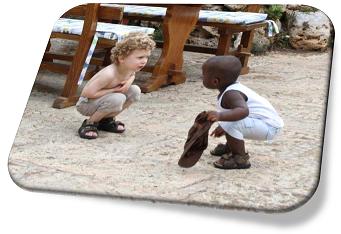The Christian: A Friend Sixth in Series: What Is a Christian?
The Christian: A Friend Sixth in Series: What Is a Christian?
Read John 15:8-17.
We have been thinking these Wednesdays about a number of different descriptive terms that the New Testament uses for Christians. We have thought about what it means to be a Christian, and the emphasis has been on the "being" rather than the "doing." Christians in the New Testament do a great deal, but they don’t do anything as Christians unless they first of all are Christians. And if anything is clear in the New Testament it is this: not all people are Christians. That would be one of the most foolish, and indeed false, assumptions anyone could ever make, but it is amazing how many people make it – how many people who have actually never read the New Testament will tell us with confidence, “But we are all Christians, aren’t we?,” by which they mean you and I and the kind of people we mix with are relatively speaking decent citizens. We’re somewhere in the talk 35% of lifestyle behaviour patterns. But Jesus doesn’t make that mistake, nor does the New Testament. The New Testament actually says quite explicitly, “Not everyone is a Christian.” And Jesus, just a few minutes before he had said this (maybe an hour or so before he had said this), had actually made quite clear that not all of those who were in the room with Him were Christians. And that is the reason we have been trying to explore the different answers the New Testament gives, in order that we may get a fuller picture of what it means to be a Christian.
We have been thinking these Wednesdays about a number of different descriptive terms that the New Testament uses for Christians. We have thought about what it means to be a Christian, and the emphasis has been on the "being" rather than the "doing." Christians in the New Testament do a great deal, but they don’t do anything as Christians unless they first of all are Christians. And if anything is clear in the New Testament it is this: not all people are Christians. That would be one of the most foolish, and indeed false, assumptions anyone could ever make, but it is amazing how many people make it – how many people who have actually never read the New Testament will tell us with confidence, “But we are all Christians, aren’t we?,” by which they mean you and I and the kind of people we mix with are relatively speaking decent citizens. We’re somewhere in the talk 35% of lifestyle behaviour patterns. But Jesus doesn’t make that mistake, nor does the New Testament. The New Testament actually says quite explicitly, “Not everyone is a Christian.” And Jesus, just a few minutes before he had said this (maybe an hour or so before he had said this), had actually made quite clear that not all of those who were in the room with Him were Christians. And that is the reason we have been trying to explore the different answers the New Testament gives, in order that we may get a fuller picture of what it means to be a Christian.
We have thought about such words as, obviously, "Christian." We have thought about that fascinating word "saint," and discovered that all Christians are saints. And we have thought about other terms. But we come to a very special term today that I think is used of Christians only in this passage, and used only by the Lord Jesus. “Christians” says Jesus, “are Jesus’ friends.” Now, it is true that in the Old Testament Abraham was called "the friend of God." James refers to that in his little letter towards the end the New Testament, and says that “Abraham was called the friend of God” (James 2:23). And he is actually quoting some words of God from the prophet Isaiah, “Abraham, my friend” (Isaiah 41:8). But here in this passage it is clear that Jesus is bringing His disciples into a new dimension of their relationship with Him.

Some of you have heard before, and probably some of you share this perspective, how much I lament the idea that everyone should call everyone else by their Christian name. It has become very fashionable nowadays, I have noticed, for your daughter’s husband or your son’s wife to call you by your Christian name. It is almost astonishing now in our time not to do that. I remember going to the hairdresser in the United States for the very first time, and she said to me, “What is your name?” (Transcription of audio file from 06:02 to 06:07, 06:15 to 06:42 omitted.) And I said, “Ferguson.” “Oh no,” she said, “What is your first name?” I said, “It’s Sinclair.” “Well, Sinclair” she said. And we have lost something in that. We have lost the ability to say to somebody (I don’t think I would have said it to her), “My name is Ferguson, but you can call me Sinclair.” Do you remember the day when that was common? When you knew somebody you respected who was older, and at some point in life they said to you, “Please, call me John.” You know, until that point you had been addressing them as “O great and mighty one, may I draw near to your matchless eminence?” And they have said to you, “Call me by my Christian name.” And it marks a new stage, doesn’t it? It marks a stage of friendship and intimacy.
And this is what Jesus is saying to the disciples here. He says, “Up until this point, you have thought about yourselves as my servants and me as your master, and that relationship is still in place.” Think about some of us who have been invited to call people we admire by their Christian name, and we have almost thought, “I could never do that.” But we have done it, and it has meant much to us, but we have never lost the other aspect of the relationship. Jesus is saying, “From now on, I want to call you my friends, and I want you to think about our relationship together as a relationship of friendship.” So what does He mean? What is that transition, for example, from being Jesus’ servants to being His friends without ceasing to think of ourselves as His servants, or dreaming for a moment that we are His equals? Well, there are several things – and actually, John’s Gospel in many ways has been building up to this.
A Friend Is Someone to Whom Jesus Entrusts Himself⤒🔗
A friend for Jesus is, first of all, someone to whom He entrusts Himself. A friend is someone to whom Jesus entrusts Himself. Now, you might think at first sight, “Surely you should put that the other way round.” A friend of Jesus is somebody who trusts Him, but the point Jesus is actually making here in John’s Gospel is that, for all their frailty (and they’re going to demonstrate that within the night as they disappear into the darkness of Jerusalem, only to reappear with great courage the next day to watch Him being crucified), Jesus is saying to them, “For all your frailty, I am entrusting myself to you.” Actually, John had given us a little hint of what this means at the end of the second chapter of his Gospel, when he tells us that there were people who believed in Jesus (he doesn’t explain fully what it was that they believed about Jesus), but then John goes on to say, “But Jesus didn’t entrust Himself to them, because He knew what was in them.” He knew that He couldn’t give Himself fully to them because they couldn’t yet fully receive Him as their Lord and Master.

And now as He has brought His disciples on, as He has shown them His works of power, as He has taught them, as He has washed their feet, as He is teaching them even more, He is saying to them, “Before I die, there is one thing I want you men to realize: that I am now entrusting myself to you. You are not only my servants; you are now my friends.” Actually, when you think about it, that is what a church is, isn’t it? The church is the community to whom Jesus has, in a sense, entrusted everything about Himself. The church has the Bible. The church has the presence of Jesus. The church has the gospel. The church has the lifestyle of Jesus’ friends. In a dramatic and radical way, the Lord Jesus entrusts Himself to those who call Him Saviour, and says, “Now, I want you to think of yourself as my friend.” And He makes this clear, doesn’t He? He says the difference between a servant and a friend is that a servant doesn’t know what His master is doing. Verse 15: “No longer do I call you servants, for the servant does not know what His master is doing. But I have called you friends, for all that I have heard from my Father I have made known to you.”
He does not mean, “You understand everything I am doing.” He just said to Peter, “You don’t understand what I am doing now, but afterwards you will understand.” What He means is that they have got hold of the secret. They understand who He is – that He is their Saviour; that He is their Master; that He has brought them into a new and living relationship with God. And, in a sense, He wants to share more and more secrets with them. And we understood that from childhood, didn’t we? This is maybe more a female thing than a male thing; it happens in boys as well, but for girls what marks you out as a friend is that “you are prepared to share your secrets with me and I am prepared to share my secrets with you.” So a friend of Jesus is somebody who knows some of Jesus secrets. I wonder if you ever sing that hymn that has the line in it “The love of Jesus – what it is none but His loved ones know.” Knowing the love of Jesus, tasting the love of Jesus – that is one of the secrets that He shares with His friends. So a friend is someone to whom Jesus entrusts Himself.
A Friend Is Someone Jesus Wants to Spend Time With←⤒🔗
Second – and actually, this is written all over this section, especially when you think about the context. Here is Jesus at the great crisis point of His life; spiritually it is an enormous crisis. When He leaves this room, He is going to be in the Garden of Gethsemane and sweating great globules of sweat, agonizing in the Garden. And He wants His friends to be with Him now. He wants their comfort and their fellowship, and He wants to spend time with them. In fact, the Gospels tell us that this was the reason Jesus actually called these disciples, the apostles – in order, says the Gospel, that they might be with Him. So one of the marks of my being a friend of Jesus actually would be quite simply this: Jesus wants to spent time with me. And correspondingly, I want to spent time with Him, because that is what you do with a friend. You are eager to spend time with them. You see this in youngsters as well, don’t you? Here is somebody in a class in school and they have unusual qualities and graces, and the other children almost fight for the privilege of spending time with them. And that is what it means to be a friend of Jesus – you just want to spent time with Him, and He wants to spend time with you.

I have a book that I wrote thirty years ago, and it carries this line in the dedication page: “To Dorothy, my best friend.” One of my friends, a couple of months after it came out, phoned me up one day and told me how much he had enjoyed the book, which was very nice of him. He said, “I have only one question,” and I thought, “Oh no, here it comes. What have I done wrong?” He said, “Who is Dorothy?” For those of you who are visitors, my wife’s name is Dorothy. And I said, “It is Dorothy, my wife!” “Oh,” he said, “that Dorothy!” But that is what marriage is, isn’t it? You are in the soup if that’s not what your marriage is. It is that kind of friendship in which, when people say to you (as I know people say to me), “What do you and your wife like doing?” I always say, “Nothing.” I just like sitting and looking at her, trying to understand her, getting to know her. So it doesn’t really matter so much what we are doing, as long as we are doing it together.
And that is what Jesus is introducing these disciples to. Not just service, not just the privilege of knowing Him as our Lord (that actually, because we are sinful, we can so easily twist service into servitude, and can begin to complain about how difficult it is to follow Christ and to be a Christian), but friendship in which we want to spend time with Him, and even more amazingly, He wants to spend time with us.
A Friend Is Someone to Whom Jesus Looks to Stick Up For Him←⤒🔗
And then there is a third thing. A friend is someone who will stick up for you when times are tough. And actually Jesus, in the passage that follows here, is going on to explain to His apostles that in the world they are going to have tribulation. That just as the world hates Jesus rather than loves Jesus, sees Jesus as enemy rather than friend, so the world will see those who are Jesus’ friends as its enemy. The friend of my enemy is my enemy. That is how the world works. Most of us in this room have experienced that at a personal level. Somebody who is at loggerheads with somebody else, who wants you to be at loggerheads with them for the simple reason they are at loggerheads with them. And Jesus knows that this will be characteristic of the Christian life – that those who love Him, who are marked out as His friends will also be marked out as the enemies of some. If the world hates Jesus, then the world will also hate us.
But Jesus sees as His friends those who will stick up for Him. That was tested that very night. Peter failed so miserably. Jesus called him a friend, and actually the next thing we know about Peter is that he tried to defend Jesus with a sword rather than with faith. And when he failed to do that, he just denied Jesus. “You are one of His friends, aren’t you?” said the little servant girl. Actually, if it had been Roman centurion maybe Peter would have had the courage to stand up to him and say, “This is a real contest. I am Jesus’ friend.” But it was a servant girl. Slipped in there and then slipped out. Before he could close his mouth it slipped out, “I don’t know Him; I am not His friend.” Thankfully, Jesus had befriended him and was praying for him and would restore him. That is a great encouragement. There is nobody in this room who has not done what Simon Peter did. If you are a Christian you have done what Simon Peter did. There has been some occasion, probably many occasions, in your life where you have had the opportunity, although it would cost you something, to say, “But I am a friend of Jesus, and therefore this is how I respond. This is what I do. This is how I will not function” and you’ve closed your mouth. So He is looking for friends who will stick up for Him.

Jesus Wants His Friends to Be Friends with Each Other←⤒🔗
And there is another thing here. It is not just that a friend is someone to whom Jesus entrusts Himself, someone with whom He wants to spend time, someone to whom He looks to stick up for Him in a world like this, but here is something really wonderful: Jesus wants His friends to be friends with each other. That should be one of the cardinal characteristics of your life in whatever Christian church you might belong to – that people would be able to just watch you with other Christians and say, “I can’t understand why these two people should be such fast friends, because I can’t see what they see in each other. They seem so different.” They could belong to different countries. They could belong to totally different places in the social strata. They could be completely different people in terms of intellectual capabilities. Their interests may be radically different. They just can’t understand what it is that would bring these two people together as friends. That is the beauty of the church, that the most unlikely people become friends because the Lord Jesus loves to introduce His friends to His friends.
So Christians are Jesus’ friends. I think this is true at whatever point a person begins openly to confess Jesus Christ: that one of the questions that arises in all of our minds is, “Am I going to lose friends?” The answer is partly “Yes, but if you lose them they were never real friends in the first place.” But the other part of the answer is that Jesus has promised to give you multiplied times more friends than you could ever lose. He said that quite explicitly. “No one gives up anything,” including friends, “without receiving a hundredfold in this world, even if it is with persecution, and in the world to come, eternal life.” Just looking at people I know quite well, I could just point you out and say, “Now, tell me if that has been true for you.” And you would say, “Of course it has been true for me.” It is true for every believer, that He simply keeps giving us more and more and more friends because of the kind of friend He is.

When our children were very small, I remember our second son (it must have been around Christmas time) – in Sunday school their playtime had been spent making Christmas cards for their dads and moms. (Transcription of audio file from 25:10 to 25:18, 25:26 to 25:32, 25:39 to 25:42 omitted.) Our second son came home and handed us the Christmas card the Sunday before Christmas. When we opened it up, the two of us, we were kind of horrified actually, because they had all been told to put a Bible text in the Christmas card. And you expect, “Call His name Jesus, because He will save His people from their sins”, or, “Immanuel, God with us,” or, “They worshipped Him,” or something like that. Not our Peter. He wrote the words, stretched right across the open Christmas card, “There are friends who pretend to be friends”, which of course is from the book of Proverbs. “There are friends who pretend to be friends, but there is a friend…,” and by that time he got to the right hand side of the paper, and he put in three dots. We are turning over to the back page – “There are friends who pretend to be friends, but there is a friend” – and on the back page in big letters: “Jesus.” And that is how it is, isn’t it? It is very sad, but “there are friends who pretend to be friends, but there is a friend who sticketh closer than a brother” – Jesus!

Add new comment